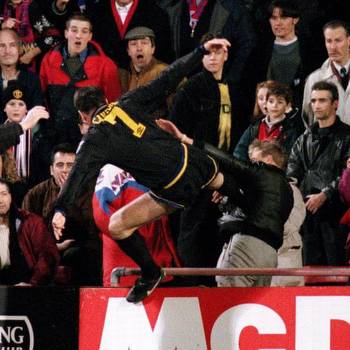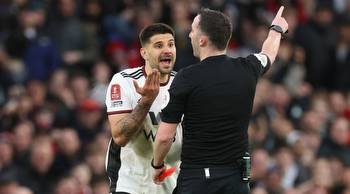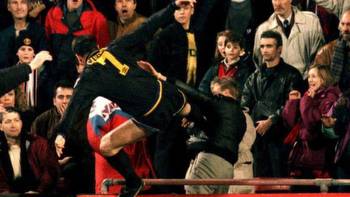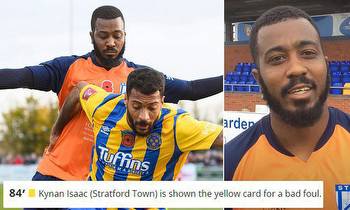Football's 12 longest bans as Ivan Toney could face months out
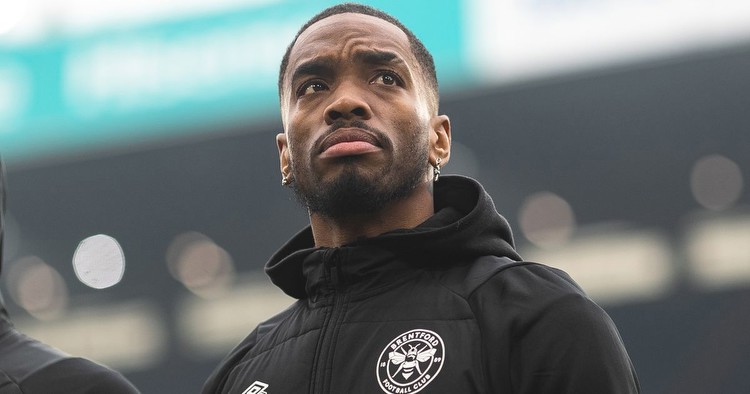
Ivan Toney is set to join the likes of Joey Barton and Rio Ferdinand in serving lengthy football bans.
The Brentford striker has pleaded guilty to many of his 262 alleged breaches of the FA's betting rules while denying others. Sky Sports report he is expected to be banned for at least six months at some point later this year.
While such a suspension is rare, many players have spent similar spells on the sidelines - and some even longer than that. On that note, here Daily Star Sport looks back at the longest bans in footy history.
Vinnie Jones - six months
It's no surprise to see perhaps the hardest man to ever grace a pitch, Vinnie Jones, kick off this list.
He shockingly hosted a video called Soccer's Hard Men in 1992 which saw him advise fellow footballers on how to increase their fear factor.
The FA initially gave the former Chelsea and Wimbledon midfielder a suspended sentence of six months, but it was enforced after he missed a hearing.
Kolo Toure - six months
Kolo Toure missed the 2011 FA Cup final with Manchester City after traces of a banned substance were found in his blood - which he claimed were his wife's water tablets he took to lose weight.
Reflecting on his six-month ban, he told the BBC in 2020: "My weight had been up and down a little bit and when you put on two, three or four kilos you are a different player.
"So I took something to make me go to the toilet more. I didn’t know I had done anything wrong. When I found out, I was shocked."
Patrice Evra - seven months
Former Manchester United defender Patrice Evra has never been fully with it - you just have to watch his social media videos to see that.
But trying to kick one of your own fans in the head is very different to his usual harmless fun. He did just that in November 2017 when a Marseille supporter had allegedly verbally abused him before a Europa League game.
The Ligue 1 club terminated his contract after he was banned from European club football for seven months by UEFA.
Adrian Mutu - six and seven months
Retired Romanian forward Adrian Mutu was banned not once, but twice for drug use. The first came during his time at Chelsea in 2004.
A positive test for cocaine saw him slapped with a seven-month ban by the FA. The Blues, meanwhile, swiftly waved him goodbye and sought compensation in a court battle which raged on for years.
That didn't stop Mutu repeating his crime as a Fiorentina player in 2010. Serie A chiefs threatened him with a year out of the game, but it was ultimately reduced to half that.
Rio Ferdinand - eight months
Manchester United and England legend Ferdinand didn't fail a doping test but rather missed one altogether in September 2003.
That was frowned upon heavily by the FA, who banned him for eight months - ruling him out of Euro 2004.
Addressing the incident on the Stripped with Specs & Vuj YouTube channel, Ferdinand said: "A guy comes to the training ground to do the drugs test and I forgot that he was there and went out for lunch.
"I looked at my messages and realised I'd missed it. I said I was coming back but they'd already left and it all kicked off from there really."
Mark Bosnich - nine months
Mutu wasn't the first Chelsea player to be banned for testing positive for cocaine use. Goalkeeper Mark Bosnich already had in September 2002.
The Stamford Bridge hierarchy released him too after he was given a ban two months longer than Mutu's.
After overcoming his addiction, the former Red Devils shot stopper finished his career back in his native Australia several years later.
Eric Cantona - nine months
Who could forget the kung-fu kick Eric Cantona delivered on a Crystal Palace supporter in January 1995 - after all, it's one of the most shocking moments in English football history.
It earned him a nine-month ban from football and initially a two-week stint behind bars for common assault.
That was later converted into 120 hours of community service, but Cantona, who showed little remorse for his actions, still had to serve his ban.
Joey Barton - 13 months
It doesn't look good for Toney given that Barton was initially given an 18-month ban by the FA for his betting breaches.
The bad boy midfielder's decade-long offences saw him place 1,260 bets on matches between 26 March 2006 and 13 May 2016.
After appealing his suspension was reduced by five months, but it still spelled the end of the Bristol Rovers manager's playing career.
Diego Maradona - 15 months (twice)
For all his genius, the late great Diego Maradona was equally controversial - and his cocaine addiction cost him on the pitch on a couple of occasions.
In 1991, the then-Napoli captain tested positive after a match and was barred from playing by the Disciplinary Commission of the Italian League for 15 months.
He was handed the same length ban three years later when he tested positive for the stimulant ephedrine at the 1994 World Cup, what turned out to be his final tournament for Argentina.
Juanito - two years and five years
We could have been speaking about supreme Spanish dribbler Juanito as one of the game's best ever players - but his temper unfortunately got in the way of his destiny.
The former Real Madrid midfielder earned himself a two-year suspension from European competitions in 1978 after assaulting referee Adolf Prokop.
And then nine years later he brutally stamped on the back and face of Bayern Munich legend Lothar Matthaus, with UEFA upping their ban to five years that time.
Peter Swan, Tony Kay, David Layne - lifetime bans, reduced to seven years
Toney will hope very much to avoid the fate of Sheffield Wednesday trio Peter Swan, Tony Kay and David Layne.
They were each given lifetime bans from football for betting on their own team to lose against Ipswich Town in December 1962, which they did 2-0.
After seven years, however, all three were allowed to return to football having served four-month prison sentences.
Roberto Rojas - lifetime ban
Chile needed to beat Brazil in a World Cup qualifier in 1989 in order to reach Italia '90 - and their goalkeeper Roberto Rojas went to extreme measures to try and help them do so.
He pretended to have been hit by a flare that was thrown from the stands of the Maracana stadium, cutting himself with a razor blade he'd hid in his gloves in an attempt to get the match abandoned - with his side losing 2-0 at the time.
The scheme was exposed by a photographer who had captured the moment. Rojas was banned for life by FIFA and although that was lifted in 2001, he never played again.











